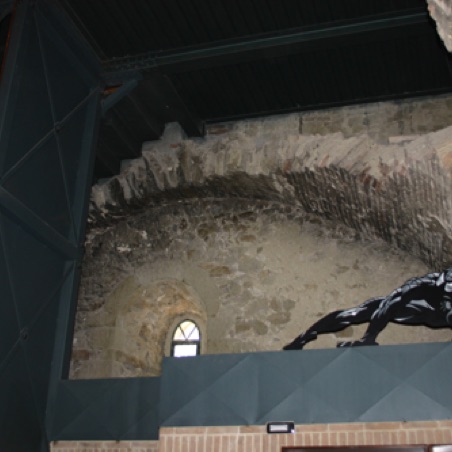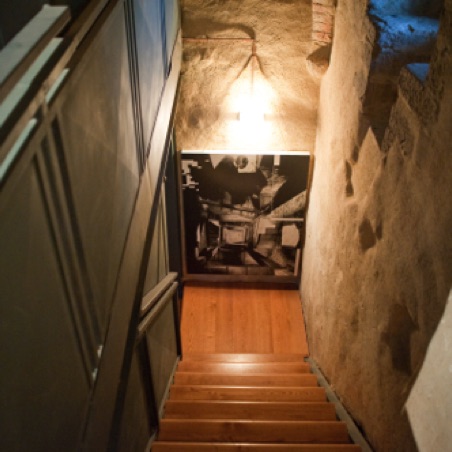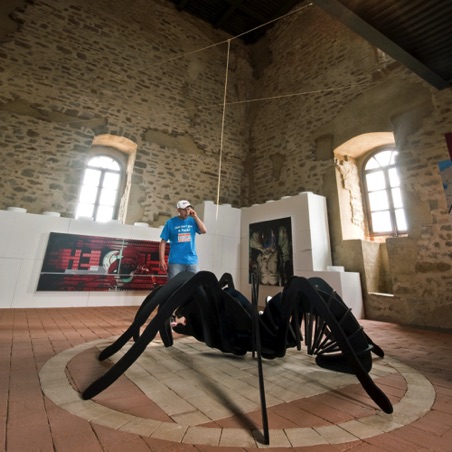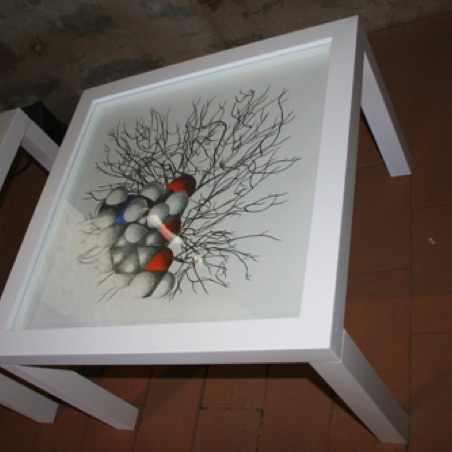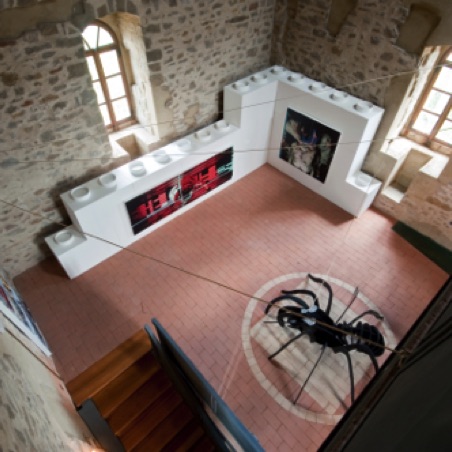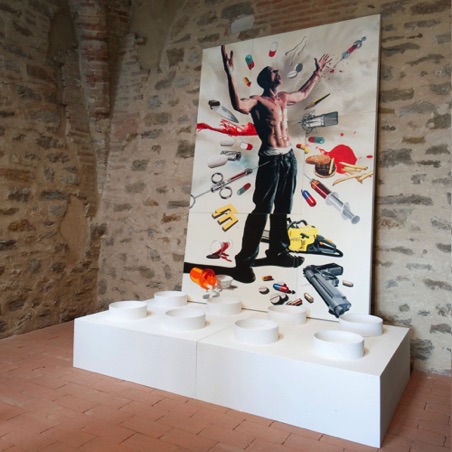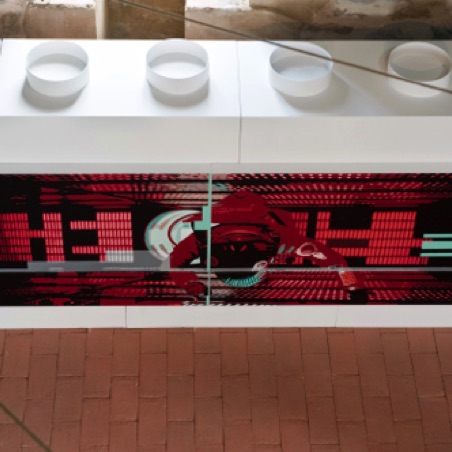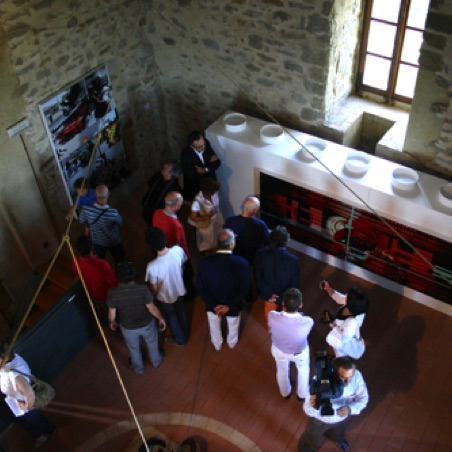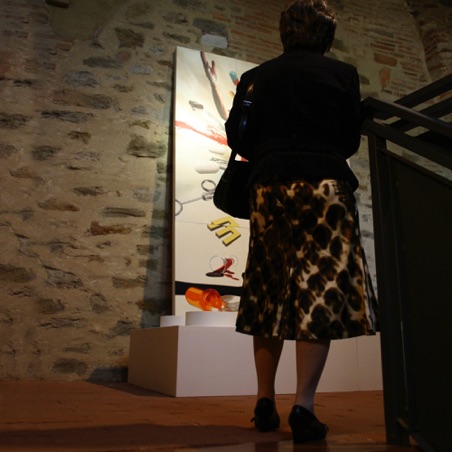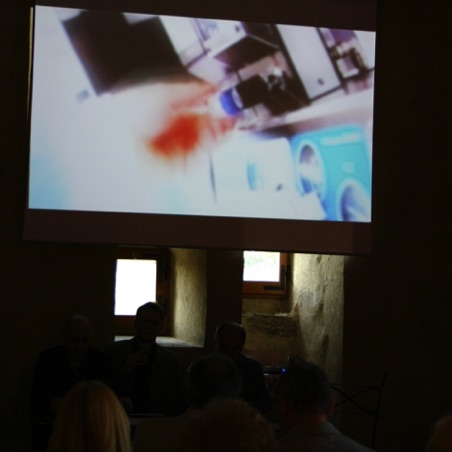giorgiolupattelli
HUMAN ALL TO HUMAN
2010. Torre dei Lambardi (MAGIONE – PERUGIA)
clicca sulle immagini
COUNTDOWN
di Maurizio Coccia
(Ten). Probabilmente qualcuno si ricorderà di Space Oddity, il vecchio successo di David Bowie. A me piace soprattutto l'inizio. Il suo incedere lento. Il ritmo marcato dalla chitarra e scandito da un sinistro conto alla rovescia. Bene, durante la lavorazione di questa mostra, non riuscivo a liberarmene. Anzi, alla fine mi sono convinto che Space Oddity potrebbe essere una sintesi, oltre che un riflesso, di Human, all too Human.
(Nine). Si dice che il pezzo fosse stato ispirato da 2001: Odissea nello spazio, di Stanley Kubrick. C'è un senso di alienazione e solitudine, in quella pellicola, che ritrovo spesso nel lavoro di Giorgio Luattelli. Non è un caso, infatti, se quel film è diventato un'ossessione, per lui. Del resto, è tutto lì, in mostra. Dall'astronauta che si confonde con la macchina alle ripetute sagome di Spyderman. Dalle immagini della velocità senza controllo all'esaltazione di una tecnologia vintage. Seducente campionario visivo di metafore legate alla condizione frantumata della nostra modernità.
(Eight). Il Maggiore Tom della canzone esce dalla capsula e si perde nel vuoto cosmico. Lasciarsi andare. Fluttuare. Perdere il controllo. Quello che per Bowie poteva essere un'allusione all'oblio dell'eroina, per Lupattelli riguarda l'uso delle sostanze chimiche come stile di vita. Stupefacenti, lenitivi psicologici o fisici. Aspirina, Prozac, Viagra, Sustanon. Ecco il nuovo “oppio dei popoli”. Il sostituto farmacologico della religione. L'ammortizzatore ideale per le nostre ansie da prestazione sociale.
(Seven, Six). Resta l'intelligenza. Ma siamo certi che l'elemento umano, mediatore fra scienza e tecnologia, ci salverà? La conoscenza, sempre più approfondita, di macro e micro cosmo, ci arrecherà sollievo? Purtroppo, sembra che l'angoscia di fronte al decadimento e alla nostra vulnerabilità sia inguaribile. Nonostante la potenza della mente. Anche il genio è impotente, così come Stephen Hawking e Rita Levi Montalcini, impietosamente ritratti nelle loro limitazioni fisiche, stanno a dimostrare.
(Five). Nemmeno il successo mondano ci consola. Il suo carattere effimero è ben noto, a Bowie come a Lupatteli. Per Giorgio ha le sembianze criminogene di Eminem, altro personaggio-feticcio. Coronato dagli attributi di una vita sempre al limite, a Magione trova la sua collocazione liturgica. La monumentale, laica pala d'altare chiude il percorso espositivo. Il corpo mistico, anche se insidiato da ogni abuso, è lì, oggetto di morbosa ostensione. Martire mediatico, immolato sull'altare di una sfrenata, selvaggia, disperata vitalità.
(Four). Un'esistenza violenta, quella di Eminem. Siamo tutti immersi nella violenza. Quotidianamente. Le guerre, certo. Gli incidenti stradali. Gli scontri fra le tifoserie. La delinquenza comune e quella domestica. E poi, parliamoci chiaro, tutto comincia da lì, dal trauma della nascita. Per finire con quell'altra, l'Innominabile. La violenza assoluta, la privazione della vita. Le tracce sono ovunque. Armi da fuoco e da taglio. Droghe e chirurgia. Supereroi e animali velenosi. Persino la Pietà, struggente icona di amore definitivo, non è cinta di cherubini, ma minacciata da bisturi.
(Three, two). Ad un certo punto, Bowie canta “Planet Earth is blue, and there's nothing I can't do” (“Il Pianeta Terra è triste e non c'è nulla che io possa fare”). Già. La religione è un analgesico. La scienza un'illusione. La saggezza rende solo più chiara la nostra debolezza. Dobbiamo rassegnarci. Giocare – fino in fondo – con regole che non conosciamo. È una crudele stanza dei giochi, quella che Lupattelli allestisce per noi a Magione. Ci dice che, insieme ai mattoncini fuori scala, all'enorme ragno, agli inquietanti personaggi dei fumetti, siamo le vittime, non gli artefici, di quel gioco.
(One). Siamo mosche che camminano su di un vetro. Per noi la realtà è la superficie della finestra, non ciò che si trova al là. E fino all'ultimo culliamo la segreta illusione della salvezza. O comunque, speriamo di essere un'eccezione nell'immenso processo biologico. Infatti, chi dice che il conto alla rovescia che sento, il suo terribile avanzare, sia l'approssimarsi della fine? Non potrebbe essere il preludio dii una nuova nascita? Non il buio eterno, ma l'accogliente anticamera del grembo materno?
(Blastoff).
(Ten). Probably somebody remembers Space Oddity, the old hit by David Bowie. I like the start mainly, its slow advancing, the rhythm marked by the guitar and beaten by a sinister countdown. Well, while working at this exhibition, I could not get rid of it. Furthermore in the end I convinced myself that Space Oddity could be a synthesis, and a reflection of Human, all too Human.
(Nine). It is said that the song was inspired by 2001: A Space Odyssey by Stanley Kubrick. There is a sense of alienation and solitude in that movie which is often to be found in Giorgio Lupattelli’s work. It is not just chance that the film became an obsession for him. Besides all is there, on display: from the astronaut which gets confused by the machine to the repeated shape of Spiderman; from the image of an uncontrolled speed to the exaltation of a vintage technology. We are facing seductive visual samples of metaphors dealing with the fragmented condition of our modernity.
(Eight). In the song Major Tom comes out of the capsule and get lost in the outer space. Being carried away, fluctuating, loosing control. What could be an allusion to the heroine-induced oblivion for Bowie, for Lupattelli concerns the use of chemical substances as a life-style. Drugs, psychological or physical palliations: Aspirina, Prozac, Viagra, Sustanon. Here is the new “people’s opium”, the pharmacological replacement of religion. The ideal cushion for the anxieties derived from social performance.
(Seven, Six). However intelligence is still there. But are we sure that the human element, intermediary between science and technology, will save us all? Will the deeper and deeper knowledge of macro and micro cosmos bring us some relief? Unfortunately it seems that the anguish we feel in front of decadence and human frailty is incurable in spite of the mind power. Genius is powerless too, as Stephen Hawking and Rita Levi Montalcini demonstrate, portrayed in their pitiless physical limits.
(Five). Neither the social success relieve our pain. Its ephemeral character is well known both by Bowie and Lupattelli. For Giorgio it has the criminogenic look of Eminem, another fetish figure. Crowned by the qualities of a life that is always on the edge, in Magione he finds his liturgical placement. The monumental, secular altar-piece closes the exhibition route. The mystic body, even if at the risk of any abuse, is there, an object of morbid ostension. A media martyr sacrificed on the alter of a wild, untamed and desperate vitality.
(Four). Eminem and his violent life. Everyday we are all plunged into violence. The war, for sure, the road accidents, the quarrels among football-team supporters, common and domestic delinquency. To say it clear the starting point is there, in the birth trauma and it ends up with the other one, the Unmentionable, the total violence, the deprivation of life. Traces are everywhere. Fire arms and knives, drugs and surgery, superheroes and poisonous animals. Even the Piety, yearning icon of final love is not surrounded by cherubs, but threatened by scalpels.
(Three, two). At a certain point Bowie sings “Planet Earth is blue, and there’s nothing I can do”. That’s it. Religion is a pain-killer, science is an illusion and wisdom only makes clearer our weakness. We must accept the unavoidable. We have to play till the end with unknown rules. It’s a cruel playroom the one prepared for us by Lupattelli in Magione. He say to us that, together with the out of scale Lego, the big spider, the disturbing cartoons characters, we are victims and not makers of that play.
(One). We are like flies walking on a glass. For us reality is the window’s surface, not what is beyond. Till the end we cherish the secret illusion of salvation, or however we hope to be an exception in the immense biological process. In fact, who knows whether the countdown I’m listening to, in his terrible progress is the drawing near of the end? Could it not be a prelude for a new birth? I mean, couldn’t it be the welcoming ante-room of maternal womb instead of the everlasting dark?
(Blast off)


